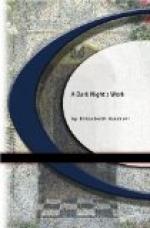It was very hard work for Ellinor to do her duty as a guest, and to allow herself to be interested and talked to on local affairs by her host and hostess. But she felt as if she had spoken shortly and abruptly to Mr. Johnson in their previous conversation, and that she must try and make amends for it; so she attended to all the details about the restoration of the church, and the difficulty of getting a good music-master for the three little Miss Johnsons, with all her usual gentle good breeding and patience, though no one can tell how her heart and imagination were full of the coming interview with poor old Dixon.
By-and-by Mr. Johnson was called out of the room to see Mr. Ormerod, and receive the order of admission from him. Ellinor clasped her hands tight together as she listened with apparent composure to Mrs Johnson’s never-ending praise of the Hullah system. But when Mr. Johnson returned, she could not help interrupting her eulogy, and saying—
“Then I may go now?”
Yes, the order was there—she might go, and Mr. Johnson would accompany her, to see that she met with no difficulty or obstacle.
As they walked thither, he told her that some one—a turnkey, or some one—would have to be present at the interview; that such was always the rule in the case of condemned prisoners; but that if this third person was “obliging,” he would keep out of earshot. Mr. Johnson quietly took care to see that the turnkey who accompanied Ellinor was “obliging.”
The man took her across high-walled courts, along stone corridors, and through many locked doors, before they came to the condemned cells.
“I’ve had three at a time in here,” said he, unlocking the final door, “after Judge Morton had been here. We always called him the ’Hanging Judge.’ But its five years since he died, and now there’s never more than one in at a time; though once it was a woman for poisoning her husband. Mary Jones was her name.”
The stone passage out of which the cells opened was light, and bare, and scrupulously clean. Over each door was a small barred window, and an outer window of the same description was placed high up in the cell, which the turnkey now opened.
Old Abraham Dixon was sitting on the side of his bed, doing nothing. His head was bent, his frame sunk, and he did not seem to care to turn round and see who it was that entered.
Ellinor tried to keep down her sobs while the man went up to him, and laying his hand on his shoulder, and lightly shaking him, he said:
“Here’s a friend come to see you, Dixon.” Then, turning to Ellinor, he added, “There’s some as takes it in this kind o’ stunned way, while others are as restless as a wild beast in a cage, after they’re sentenced.” And then he withdrew into the passage, leaving the door open, so that he could see all that passed if he chose to look, but ostentatiously keeping his eyes averted, and whistling to himself, so that he could not hear what they said to each other.




